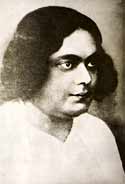 To understand Nazrul’s literature, it is necessary to first understand the country he lived in and the major changes that occurred throughout his lifetime. To understand Nazrul’s literature, it is necessary to first understand the country he lived in and the major changes that occurred throughout his lifetime.
Nazrul was born into a poor farming community in 1899. Already, stirrings of Independence were well underway. The Indian Sub-continent was changing radically: the formation of the Indian Congress and the end of British rule; proposals for the partition of Bengal; the revolt of the Indigo planters; peasant’s agitation and many social and educational reforms helped shaped the continent; change is still occurring today.
When Nazrul was still at school, the Swaraj (self-government) and violent political movements were gaining momentum. These touched and made a strong impression in his poetic sensibilities. He must also have been strongly influenced by his visit to riverine East Bengal in 1914, whose scenic beauty and varied folk songs must have influenced the budding poet. His knowledge increased in Karachi (now in Pakistan) as a solider of the 49th Bengal Regiment of the British Indian Army, where he was able to get easy access to the vast land of Persian mystic poetry.
In 1919, with the conclusion of the First World War, the people of the Sub-continent aspired to be granted Swaraj as agreed upon for participating in the war. Instead, repressive measures including brutal murders in Jaliwanwalabagh and Gujranwala took place. Nazrul was himself beaten and imprisoned, as were thousands of nationalists and freedom fighters.
The Sub-continent was waiting for a poet who could display the exuberation and frustration of the country. Both Hindus and Muslims discovered it in Nazrul. Nazrul wrote poems and songs inspiring not only the youths and students, but also peasants, fishermen, farmers, labourers and women to fight for their country in a range of different ways.
|
“You must lead them to victory.
O Captain, my Captain, the helpless nation is under water
It does not know how to swim.
I shall watch tonight
Your determination, grim yet bright.
To free the country from slavery.
“Are they Hindus or Muslims ?”
Who ask this question, I say.
Tell him, my captain,
The children of the motherland are drowning today.” |